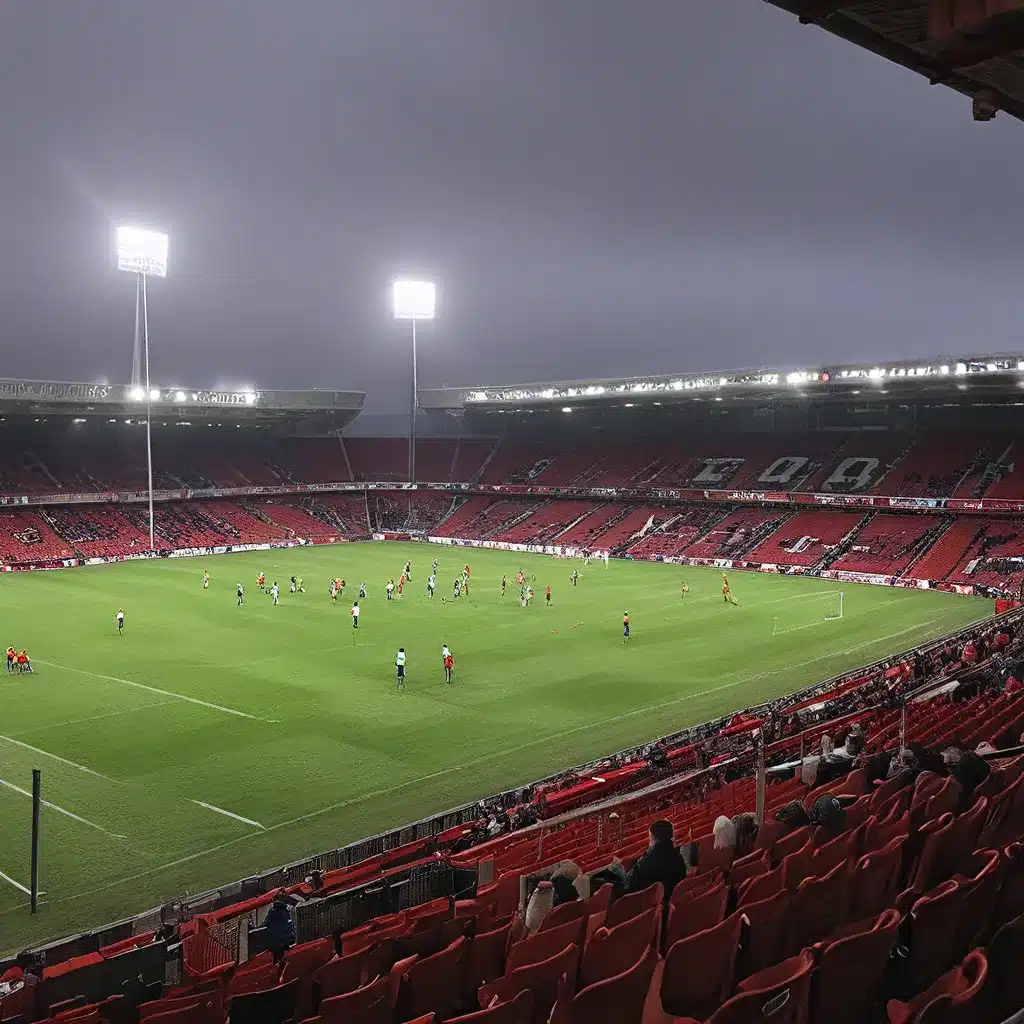
A Storied Sanctuary for the Munster Faithful
Nestled in the heart of Limerick, Ireland, Thomond Park stands as a hallowed ground for the devoted followers of Munster Rugby. This iconic stadium has been the beating heart of the province’s passionate fan base for decades, serving as a sanctuary where the faithful gather to witness their beloved team battle against the fiercest of rivals.
Thomond Park’s history is intertwined with the very fabric of Limerick, a city that has long been synonymous with the sport of rugby union. The stadium’s origins can be traced back to the late 19th century, when the Munster Branch of the Irish Rugby Football Union acquired a plot of land on the city’s northside, providing a permanent home for the province’s rugby activities.
The Limerick visitor guide reveals that the original Thomond Park, constructed in 1888, was a modest affair, with a small grandstand and terracing. However, the venue soon became a hub for the region’s rugby enthusiasts, who flocked to the ground to support their local heroes.
Forging an Unbreakable Bond: Munster’s Unwavering Passion
Over the decades, Thomond Park has evolved and expanded, but its enduring significance to the Munster Rugby faithful has never wavered. The province’s passionate supporters, renowned for their vociferous backing, have forged an unbreakable bond with the hallowed ground, transforming it into a true fortress for their beloved team.
This connection between the fans and the stadium was perhaps most vividly demonstrated in the historic 1978 victory over the All Blacks. On that fateful day, Munster achieved the unthinkable, defeating the mighty New Zealand national team in a match that has become the stuff of legend. The deafening roar of the Thomond Park faithful, who spurred their team on to an unlikely triumph, has become etched in the memory of all who witnessed it.
A Cathedral of Rugby: Thomond Park’s Architectural Evolution
The physical transformation of Thomond Park has been no less remarkable than the emotional connection forged between the fans and the stadium. Over the years, the venue has undergone a series of expansions and renovations, each one aimed at enhancing the match-day experience for the devoted Munster supporters.
The architectural features of Thomond Park have evolved to reflect the growing stature and ambition of Munster Rugby. The stadium’s imposing limestone facade and soaring roofline lend it an air of grandeur, earning it the moniker of the “Cathedral of Rugby.”
The most recent redevelopment, completed in 2008, saw the capacity of Thomond Park increase to over 26,000, with the addition of modern amenities and hospitality facilities. This expansion has enabled the stadium to host increasingly prestigious events, including European Rugby Champions Cup matches and international fixtures.
A Fortress Forged in Passion: Thomond Park’s Formidable Home Advantage
The transformation of Thomond Park has not only enhanced the match-day experience for fans but has also contributed to the formidable home advantage that Munster Rugby has enjoyed over the years. The stadium’s unique atmosphere, fueled by the unwavering support of the Munster faithful, has proven to be a daunting challenge for visiting teams.
Opponents have often found themselves overwhelmed by the sheer intensity and volume of the crowd, with the stadium’s renowned acoustics amplifying the roar of the supporters. This cauldron-like environment has been a crucial factor in Munster’s success, with the province boasting an enviable record at their hallowed ground.
The 2023 URC semi-final between Munster and Glasgow Warriors is a testament to the intimidating nature of Thomond Park. Despite Glasgow’s impressive form, the Warriors were ultimately undone by the relentless support of the Munster faithful, who spurred their team on to a hard-fought victory.
A Beacon of Munster Pride: Thomond Park’s Cultural Significance
Thomond Park’s significance extends far beyond the confines of the rugby pitch. The stadium has become a cultural touchstone for the people of Limerick and the broader Munster region, serving as a symbol of their shared identity and unwavering pride.
The stadium’s architectural design, with its iconic limestone facade, has become a recognizable landmark within the city, drawing visitors from near and far. The pre-match rituals and traditions, such as the singing of the Munster anthem, have become an integral part of the Thomond Park experience, fostering a sense of community and belonging among the Munster faithful.
Moreover, the stadium has played a vital role in the region’s economic and social development, serving as a hub for not only rugby but also other cultural events and community initiatives. The stadium’s event spaces and hospitality facilities have become a sought-after destination for a wide range of functions, from corporate events to music concerts.
A Timeless Bastion of Rugby Excellence: Thomond Park’s Legacy
As Munster Rugby continues to write new chapters in its storied history, Thomond Park remains a timeless bastion of rugby excellence. The stadium’s enduring legacy is a testament to the unwavering passion and commitment of the Munster faithful, who have imbued the ground with a spirit that transcends the boundaries of the sport.
Whether it’s the roar of the crowd during a tense European clash or the thunderous applause that greets a hometown hero, Thomond Park has become a sanctuary where the traditions of Munster Rugby are celebrated and preserved. This stadium journey has captivated countless rugby enthusiasts, who have come to revere the ground as a hallowed temple of the game.
As the province’s faithful continue to flock to Thomond Park, the stadium’s role as a centerpiece of Munster’s rugby identity is assured. The bond between the fans and their beloved ground is a testament to the power of sport to unite communities and forge enduring legacies. In the annals of rugby history, Thomond Park will forever be remembered as a timeless icon, a sanctuary where the elements of passion, triumph, and community converge to create an unparalleled sporting experience.

